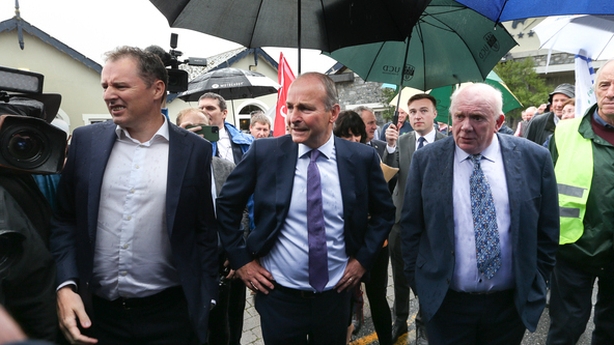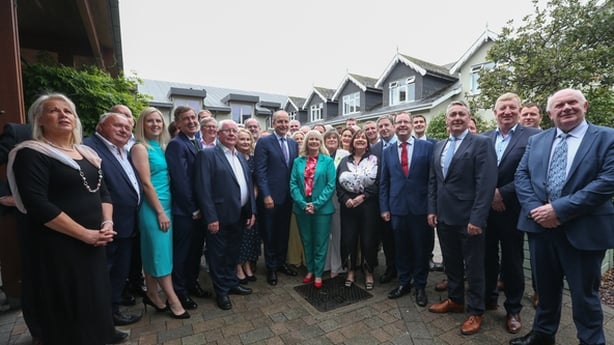There's a blot on the horizon that threatens to dash the optimism among politicians ahead of the Fianna Fáil Ard Fheis.
While there's palpable excitement around next year's elections, and a lot of positivity about the party's prospects, political scientists and even politicians themselves admit there are difficulties recruiting new candidates.
Still, there are elections to plan and today's Ard Fheis - Fianna Fáil's 81st - begins this morning with a meet and greet with the party's two sitting MEPs, Barry Andrews and Billy Kelleher.
The pair, who both hope to retain their seats in the European elections next June, will also be sharing their insights at the first session of the day, entitled 'Shaping Ireland's Future in Europe: Tackling Disinformation and Populism in Politics'.
Fianna Fáil’s director of elections for the European Parliament contest, Minister for Housing Darragh O'Brien, says the priority is for Barry Andrews and Billy Kelleher to retain their seats.
Mr O'Brien also says there's an opportunity to gain a seat in Midlands North West where the party isn't represented.

Ireland is getting an additional MEP next year, bringing the total to 14.
It's widely expected that an extra seat will go to the Midlands North West constituency, bringing it from a four-seater to a five-seat constituency.
Senator Lisa Chambers is hopeful she'll get selected to run in Midlands North West, and says that she's been working on that goal "for some time".
Mr O'Brien expects that the Electoral Commission will give its recommendation on where the extra seat will go before the end of the month, and he hopes to have a selection convention as quickly as possible after that.
He says Fianna Fáil's MEPs are aligned with the opinion of the vast majority of the Irish population, which is pro-EU.
Senator Chambers says Ireland has a small group of MEPs (soon to be 14 out of 705), so "it’s important we represent the country well".
She's confident Fianna Fáil will take a seat in the constituency, and that on a good day, the party could even take two, but admits that representing such a vast constituency is daunting.
"Whoever is selected, there'll be big expectations [they'll win the seat] as Fianna Fáil hasn’t had an MEP in ten years [in Midlands North West]."
Senator Niall Blaney from Donegal has also expressed his desire to run in the European elections, but will the party run two candidates?
The local elections are a different beast.
The director of elections for the local election is Minister of State Jack Chambers who says he expects to have 300 candidates declared by the end of the month.
Around 90% of selection conventions are under way or complete and 212 candidates had declared as of last month.
Mr Chambers says his first priority is "to remain the largest party in local government (the party has 276 councillors) and to identify a number of areas where we left seats behind" in 2019.
There is a significant proportion of sitting councillors hoping to retain their seats, which skews the numbers somewhat in favour of men, as there are far more male councillors in the party than female.
Around 23% of new candidates are women, a figure the Mr Chambers says he would like to build on, but he adds the party is ahead of schedule.
Some 147 out of 166 electoral areas have either started or completed the process, "we’ve never been as far advanced as this," he said.
Lecturer in politics at TU Dublin Kevin Cunningham is impressed at how far along the process the party is but says Fianna Fáil is under a lot of pressure as regards the gender quota.
Dr Cunningham says they'll need a lot of strong women candidates, adding that "if they don’t make the quota, it'll be a disaster".
Tánaiste says he would like the Govt to run to full term in 2025
Unlike in a general election, there's no requirement for a minimum number of female candidates for a local election, but Fianna Fáil TDs and Senators all say they need to have more women running.
One of the sessions on the agenda at the Ard Fheis is entitled: "Women in Politics: Preparing to Run and Succeed in the 2024 Local Elections".
Asked about the challenges of persuading women to run, Mr Chambers says it can be hard to convince people of all genders to run.
He says some people view the prospect of entering politics as daunting, citing the high-profile cases of abuse suffered by some in the party, included targeted abuse of Minister of State Mary Butler and Senator Chambers.
But he's sanguine about it and believes the vast majority of politicians have positive experiences.
TD for Kildare North James Lawless says it can be hard to attract new candidates, and it's not just about women.
"It’s not easy, we are trying, it’s getting harder to attract people of any background or gender to politics now," he says.
He cites the abuse levelled at elected representatives, something he has personal experience of, he and his family have received threats.

Senator Fiona O'Loughlin points out that research shows women suffer greater levels of abuse, saying it can be "very personalised" on social media.
She adds politics is still a noble profession and thinks politicians themselves have a role to play in trying to take the nastiness out of their interactions with their political colleagues.
On the challenges of maintaining a work/life balance for local politicians, Minister Chambers admits that more needs to be done.
"Some councils have tried to adapt working hours to make it more family-friendly. There is discretion there", he says, adding that getting more women elected will allow for a better shaping of how councils are run.
There's an element of chicken and egg here, as so many incumbents are men, therefore the pool of candidates is skewed towards men and yet in order to make it better for women, who disproportionately do caring work, more women need to get elected.
Maynooth University lecturer Adrian Kavanagh, who keeps a tally of local election candidates, believes the party is struggling to get new women to run.
He says that's not limited to Fianna Fáil, but that fewer people are interested in becoming politicians, especially at a local level, because it's too difficult a job. "People don’t want it as much as they used to".
He says that Sinn Féin is doing far better with the number of female candidates because of its poor performance at the last local election in 2019.
"It’s easier for Sinn Féin as they don't have so many male incumbents" and so can run more women.
Despite the challenges of attracting new blood, there's a real sense of enthusiasm about the Fianna Fáil old guard within the party.
Many senior figures are clear in their view that Tánaiste Micheál Martin would lead the party into the next election.
One source says the threatened heave against Mr Martin is now firmly in the past.
They add there were some difficult years with fractious parliamentary party meetings every Wednesday, but that the party had all rowed in behind the leader now.
Another adds there are no more mutterings about Mr Martin, saying there was a general acknowledgement that the party needed him.
Part of this is down to favourable ratings for the Fianna Fáil leader in the polls.
Senior figures believe he is a safe pair of hands who has maintained almost as high a profile as Tánaiste as he did when Taoiseach.
Mr Lawless says Micheál Martin was at the helm of the Government during much of the pandemic and the invasion of Ukraine by Russia.
"We had a serious man at a serious time, and people responded to that".







